
THE VOICE OF INTERNATIONAL LITHUANIA
|
VilNews has its own Google archive! Type a word in the above search box to find any article.
You can also follow us on Facebook. We have two different pages. Click to open and join.
|
News
The California Baptist who collected 5000 Jewish books and brought them all to Lithuania
- Posted by - (8) Comment

Wyman Brent Wyman Brent is not like California Baptists in general. Several years ago he fell in love with Vilnius, now living here permanently. “I plan to live here for the rest of my life,” he says. His great passion in life is Jewish books – books written by or about Jews. Therefore, he has over the latest years bought more than 5,000 such books and taken them to Vilnius to open a Jewish library. Read his own story about motives and ideals for a meaningful life.
Text: Wyman Brent
Using a wire brush to scrub a broken sink can help strengthen Jewish culture. Most people are not aware of this. Thus I found myself kneeling in a parking lot on a hot summer day with a hose and attempting to remove concrete dust from an old metal sink. To aid in the cleaning, the hose was turned on to wash away the dirt and dust. After a while, there was quite a stream of water running over the asphalt, down the street where it took a right at the intersection until it reached a storm drain. I only noticed this at the end when hot and tired, I was going to a café to get a cold drink.
What I did pay attention to while repeatedly running the brush and hose back and forth, up and down, left and right was the puddle created. The tiny pool of water gave off a big reflection of trains, trains going one direction or another, one city or another. Trains carrying passengers and trains carrying freight. That was now, but what about then. I had sat out many times over the past months on a balcony overlooking the parking lot from which one could sit and drink coffee or tea (your choice) and watch the trains roll by. It is an idyllic place to relax and read a good Jewish book…or maybe better to say a book by a Jew. I have a wide variety of reading material.
It never really occurred to me to think of how that rail line might have been used during the war. How many freight cars carrying ammunition, weapons, and other supplies did the Nazis send along that same line all those years ago? How many cattle cars were filled to beyond human capacity with people whose only “crime” was to be Jewish? It did occur to me this day as I looked at the puddle which I created as a result of working to improve Jewish life in Vilna. The thought brought tears to my eyes, and I was glad to be alone at that moment.
So how exactly does an old sink going from dirt and dust encrusted to somewhat less filthy improve things Jewish? The next day was to be the second event to promote the Vilnius Jewish Library. The first event had been a big success with members of the Jewish community, members of Parliament, and various Ambassadors in attendance. There was a presentation of books and other materials which would be in the future library when its doors were open to the public. The second event would present similar material to the previous. So how to make it different? I wrote to a friend in California asking that very question. She suggested a dining table covered with books, shelves lined with food and books, and a sink filled with…yes books.
|
|
So how to make it different? I wrote to a friend in California asking that very question. She suggested a dining table covered with books, shelves lined with food and books, and a sink filled with…yes books. The idea was to show that Jewish life, thought, and culture was as much a part of Lithuania as the food which we consume. One can no more avoid the influence of all things Jewish here than one can avoid finding beetroot soup in any restaurant which serves traditional Lithuanian food. Both are so much part of the fabric of society. |
The idea was to show that Jewish life, thought, and culture was as much a part of Lithuania as the food which we consume. One can no more avoid the influence of all things Jewish here than one can avoid finding beetroot soup in any restaurant which serves traditional Lithuanian food. Both are so much part of the fabric of society. That brings me back to the not so raging river of water running down the street. Cars were driving through the water and pedestrians were stepping over it. Nobody gave much thought if any to where the water came from or the reason for it to be there.
A wire brush and a green garden hose gave new life to an old sink. That old sink, still very much rusted and with broken bits and pieces, did its part to help get people in Vilna to once again give serious thought to the impact which all things Jewish have had on this country. The concrete dust which coated the sink had become hardened over time. The constant moisture in the air here made sure of that. Can’t the same be said of many people’s attitudes? They forget something because it is out of sight and out of mind. The thing sits neglected in a dark corner.
That old sink received a second life. Jewish life in Lithuania is doing the same. The recent opening of the Litvak Studies Institute, and the soon to open Vilnius Jewish Library is proof of that. The Lithuanian government is providing space, funding, furniture, and staffing. What they are not providing is more material for the library. That depends on those around the world who truly care about Jewish culture. Jewish life does not begin and end only within the borders of the USA and Israel. Things will never be as they were in the Jerusalem of Lithuania. However, things can and will be better than they are now.
For the past six years, I have dedicated my life to promoting tolerance and understanding. I have gotten down on my knees underneath a hot sun to scrub a broken sink. I have lifted box after heavy box of books until my back was aching. I moved from sunny Southern California to a land where I have seen it snow as early as October and as late as April. I have spent countless hours and tens of thousands of dollars to collect and ship books, CDs, and DVDs. During my journey from California to Lithuania, I stopped along the way and bought more material for the library. There were stops in London, Budapest, and Krakow. Each time my luggage became heavier and heavier. All of this I have gladly done and will gladly do the rest of my life. What are you willing to do to help strengthen Jewish culture and to fight anti-Semitism? Nobody is asking you to get down on your hands and knees. Nobody is asking for you to spend your last dollar as I have done. What I am asking is, what will you do today for Jewish culture?
|
|
For the past six years, I have dedicated my life to promoting tolerance and understanding. I have gotten down on my knees underneath a hot sun to scrub a broken sink. I have lifted box after heavy box of books until my back was aching. I moved from sunny Southern California to a land where I have seen it snow as early as October and as late as April. I have spent countless hours and tens of thousands of dollars to collect and ship books, CDs, and DVDs. All of this I have gladly done and will gladly do the rest of my life. What are you willing to do to help strengthen Jewish culture and to fight anti-Semitism? Nobody is asking you to get down on your hands and knees. Nobody is asking for you to spend your last dollar as I have done. What I am asking is what will you do today for Jewish culture? |
Wyman’s motto:
Be ashamed to die until you have won some victory for humanity.
– Horace Mann
- Bookmark :
- Digg
- del.icio.us
- Stumbleupon
- Redit it
- Posted by - (1) Comment
The American-Lithuanian who breeds African snails in his Vilnius bathroom
Text: Aage Myhre
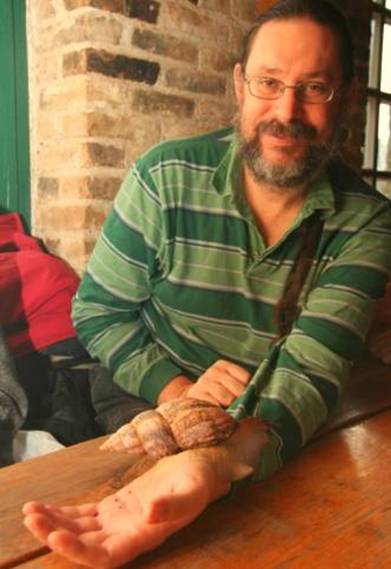
‘This snail is around one year old. It loves to explore
my shirt,’ explains Arturas.
Arturas Bakanauskas, 49, was born in California to an American father and a mother of Lithuanian ancestry. When Arturas was three years old, his father died. That was the beginning of a long journey with his mother from state to state in the U.S. – from California to Chicago, Maryland and Arkansas before finally ending up in Texas, where Arturas grew up on a homestead with his mother and stepfather.
It was during the years in Texas that Arturas began to take interest in languages. He discovered that he had a fairly unique way of organising grammar and associating vocabulary that made it possible for him to learn faster than many others who usually focus much more on grammar instead of on vocabulary.
But he was awarded a teaching degree from the Texas university where he met the woman who became his first wife. After graduation they moved to Virginia, where Arturas taught for a year.
‘When did you first take an interest in Europe?’
Arturas and I sat at a cafe table in Vilnius on Saturday afternoon last week, and I wanted to find out more about why someone who was born, raised and has lived most of his life in the United States, decided to move to Europe as an adult.
‘I wanted to move to Holland in the 4th grade when I first heard of Europe. The next year I learned about my Lithuanian roots and I concluded it was there that I wanted to live, not in the US. But under Soviet rule, that was not a possibility, even to visit. While married, any plans of Lithuania were decidedly on the back burner since my wife was not Lithuanian or had any interest in Europe or foreign languages.
Only after Lithuania’s independence in 1990-91 and my divorce in 1993 was it possible to think about Lithuania once again. I corresponded with Lithuanians for a year or so before my first visit in 1995. Only when one of them sent a copy of Lithuania in the World did I realise that the images of famine, no housing, and gangsters shooting it out on every street corner that were the only word we got of Lithuania in my part of the States were not reflective of reality and I resolved to see for myself.’ This is what he tells me when I ask him why he wanted to return to his ancestral homeland.
It felt like I had finally come home, but I also felt like I had gone 50 years back in time’ he adds over the cafe table this late autumn day in Vilnius.’
It is now fourteen years since Arturas permanently moved to Lithuania because it took him less than a year to settle all his affairs in the States and move abroad. And here we sit on a late autumn day at a cafe table in the Lithuanian capital, talking about African snails and other aspects of the life of this man who so clearly prefers a life off the beaten track.
The first months after Arturas moved to Lithuania, he lived in the western Lithuanian town of Telšiai where he worked as a teacher. But after a time he concluded that it probably would be better to live in a bigger city and so Vilnius became his new home. While living here, he met the woman who became his wife and together they have an 11-year old daughter. Arturas was so dedicated about living in Lithuania that he even renounced his US citizenship so he could become a Lithuanian citizen.
Arturas’ main occupation nowadays is translating texts such as article summaries, articles, dissertations, and reports from Lithuanian into English. If you want to see a sample of his work, look for the movie Tomas Donela’s Farewell on DVD in March.
‘Is your work characterised by anything special,’ I want to find out.
‘What distinguishes my work is that I research unlisted terms, for example, stove tile names, which takes a lot of time to do. An everyday translator usually just makes a literal translation of the terms so that the basic idea is understood, expecting an expert in the field to edit the text and correct the technical jargon. For example, I just had the term “wick regulation device” in Lithuanian. While most translators would have stopped there, I did the research and found that in English it is called a “wick knob”.
I eventually started concentrating on archaeology texts as there are very few people specialising in this area. I especially enjoy being able to make a contribution by increasing and correcting the dictionary in this field, rather than just following in others’ footsteps.’
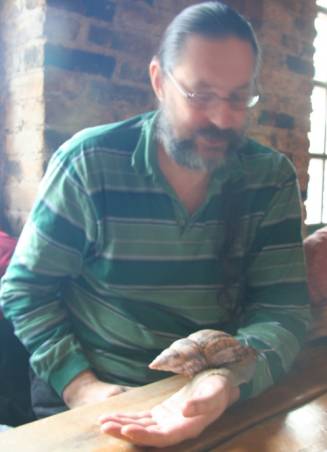
‘Snails are easier to care for than traditional pets,’
claims Arturas.
Still, it was neither archaeology nor book translations that became the main topic of conversation when we met at a cafe table this Saturday afternoon. Arturas had brought a box that he carefully placed in the middle of the table. The packaging around the box was slowly removed. And there they were; the big African snails that Arturas now breeds in his home’s bathroom here in Vilnius.
And here is how he explains his very special interest in these huge African creatures:
‘When I heard that snails can grow to 30 cm in length, I knew I had to have one if the opportunity ever presented itself. Finally it did last year and I have never regretted the decision. Not only are they easier to care for than traditional pets, they also interact strongly with their handlers.
For example, last summer we drove out to the coast one day with two of the snails in a box I was holding to keep it from vibrating. While waiting for a friend on the edge of Vilnius, I opened the snail box to see how they were taking the trip thus far. Both had woken up and seemed a bit worried about their new surroundings. So I offered one some food, which s/he refused. I looked away and when I looked back, I was just in time to see the snail very enthusiastically begin to engage the other in sex, which they continued to engage in until disturbed near the end of the trip.
On the way back, they got badly shook up on the back seat. When I noticed the situation, one snail was racing around the top of the box and the other had poked his head out of the soil, where he had tried to go to sleep, and it was just vibrating like crazy even on my legs. So I held them in my hands for about 15 minutes until they calmed down. The one snail went back to sleep, the other continued to casually look for a way out for an hour or so and then went to sleep.’
‘What did this experience tell you?’
‘This not only shows how much these primitive animals can feel and interact with people, it also shows how deeply rooted some of our instincts may be. The biggest pair of snails has become part of the family and everyone enjoys watching them eat, even for hours at a time.
Snails definitely have personalities and compete with one another. For example, you have to give two hungry snails two dishes of food. Otherwise one will cover the dish to keep the other from eating.’
So here he is, the American-Lithuanian translator and snail lover who has decided to stay in Lithuania, probably for good.
And, of course, at the end of our cafe chat this afternoon, I cannot resist asking him if he really enjoys living here.
‘Living in Lithuania has been a dream come true. Not only are the people friendly if you speak Lithuanian, the food good, and the climate great, I also have a job I love, a wonderful family, and even exotic pets.’
- Bookmark :
- Digg
- del.icio.us
- Stumbleupon
- Redit it
Our news section will cover political events
- Posted by - (0) Comment
Lithuanian President Dalia Grybauskaite evaluated the year 2010 as financially and morally difficult, however, according to the head of the state, the most difficult period is almost over.
"The year 2010 was a difficult year for Lithuania, as for many European countries. I think we managed relatively painful, but well. Lithuania withstood the financial crisis, we managed to pay pensions, salaries, people were ensured they will have food and receive salaries. It was a financially and morally difficult year," Dalia Grybauskaite said.
- Bookmark :
- Digg
- del.icio.us
- Stumbleupon
- Redit it
We will give economy its fair coverage share
- Posted by - (0) Comment
 The Lithuanian economy expanded at a faster rate in the third quarter than previously estimated as construction output grew for the first time in almost two years, revised data showed.
The Lithuanian economy expanded at a faster rate in the third quarter than previously estimated as construction output grew for the first time in almost two years, revised data showed.
Gross domestic product grew 1.1 percent, compared with a preliminary estimate of 0.6 percent released on Oct. 28, the Vilnius-based statistics office said in an e-mail. The growth rate was unchanged from the previous quarter.
- Bookmark :
- Digg
- del.icio.us
- Stumbleupon
- Redit it
We will cover the energy sector
- Posted by - (0) Comment
 Lithuanian President Dalia Grybauskaite praises the government’s efforts in reforming the energy sector but due to unfavourable international situation she iscalling for a pause in attempts of building a new nuclear power plant in Lithuania.
Lithuanian President Dalia Grybauskaite praises the government’s efforts in reforming the energy sector but due to unfavourable international situation she iscalling for a pause in attempts of building a new nuclear power plant in Lithuania.
‘I don’t mean in any way that nuclear energy should be put aside, but perhaps now we’ll have to make a certain pause, rethink and wait for a more favourable international situation without sitting and waiting.
“The fact that we practically haven’t received real proposals and the last investor refused to implement the project only shows the current international situation isn’t favourable,” the president continued. The President believes that the nuclear power should have alternatives and that Lithuania should do more in developing alternative energy.
- Bookmark :
- Digg
- del.icio.us
- Stumbleupon
- Redit it
We will follow Lithuania in the world
- Posted by - (0) Comment
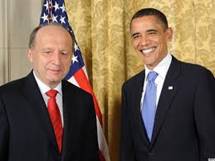 During a visit to Washing last autumn, Lithuanian Prime Minister Andrius Kubilius explained that there were some doubts about the US intentions toward the Baltic States after the United States signed the treaty with Russia on reduction of the nuclear arsenal in spring. However, those doubts were cleared by the US administration itself, Lithuania’s Prime Minister said during his interview to the public radio on 7 September.
During a visit to Washing last autumn, Lithuanian Prime Minister Andrius Kubilius explained that there were some doubts about the US intentions toward the Baltic States after the United States signed the treaty with Russia on reduction of the nuclear arsenal in spring. However, those doubts were cleared by the US administration itself, Lithuania’s Prime Minister said during his interview to the public radio on 7 September.
‘When the US president and the Russian president signed the so-called nuclear munitions restriction treaty, there were some doubts over what Russia would get for it in return. The doubts were in connection to drafting of treaties on conventional forces but they were dispelled in a very efficient and proper manner by the US administration and its representatives,’ Kubilius said in the interview. The Prime Minster once again repeated that the US has been and will remain ‘among Lithuania’s most important strategic partners.’
Lithuanian President Dalia Grybauskaite that the main reason behind snubbing Obama’s invitation to join the dinner in Prague because, ‘Seeing that this (the US and Russia treaty) could conflict with the interests of at least Eastern Europe and the Baltic region, I did not want to drink champagne to this perspective.’
- Bookmark :
- Digg
- del.icio.us
- Stumbleupon
- Redit it
Lithuania needs writing in English
- Posted by - (0) Comment
Text: Andrius Užkalnis
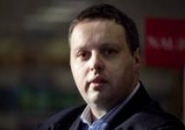 I am positive that Lithuania - not only the expats who live there - need writing in English. A lot of it. As much as possible, really.
I am positive that Lithuania - not only the expats who live there - need writing in English. A lot of it. As much as possible, really.
The presence of a vibrant expat community, which is closely linked with Lithuanians or half-Lithuanians (if I may use this term), who have spent many years overseas and had been exposed to Western culture, is critical as an ultimate mind-opener.
I have always been going against the flow in that I said good things about the Lithuanians who go abroad for a year, for five years or even for good. In Lithuania, it is often seen as a disaster and an exodus of biblical proportions with similarly apocalyptic implications. I see it as a natural part of being a free country. Even if it leads to some transformations that may even be irreversible, such as compromises over what is seen as Lithuanian ethnic purity (which is an artificial and doubtful construct anyway, in my view) or a changer of the Lithuanian identity, emigration is good because it opens the mind and creates new patterns of thinking. It opens up angles which people have not thought about. It changes the way that parts of the society interact with each other and their relationship with the government, the establishment, the educational elite.
Read more at our
Section 11 – LITHUANIA IN THE WORLD
- Bookmark :
- Digg
- del.icio.us
- Stumbleupon
- Redit it
We will focus on society, unfairness, disbalance
- Posted by - (0) Comment
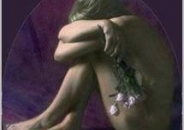 63.3 % of Lithuanian women have been victims of male physical or sexual violence or threats after their 16th birthday (world average is 33%). This represents today such a severe problem that, in my opinion, President Grybauskaite should personally get involved and take the necessary measures to turn around this devastating trend. Klaipeda municipality wants to be a pioneer-municipality in terms of focus on domestic violence and abuse of women, and I believe it could be a good idea for the President to support these good efforts and make Klaipeda a positive show case for constructive focus on domestic violence and violence against women.
63.3 % of Lithuanian women have been victims of male physical or sexual violence or threats after their 16th birthday (world average is 33%). This represents today such a severe problem that, in my opinion, President Grybauskaite should personally get involved and take the necessary measures to turn around this devastating trend. Klaipeda municipality wants to be a pioneer-municipality in terms of focus on domestic violence and abuse of women, and I believe it could be a good idea for the President to support these good efforts and make Klaipeda a positive show case for constructive focus on domestic violence and violence against women.
Read more at our
Section 9 – LITHUANIA TODAY
- Bookmark :
- Digg
- del.icio.us
- Stumbleupon
- Redit it
VilNews e-magazine is published in Vilnius, Lithuania. Editor-in-Chief: Mr. Aage Myhre. Inquires to the editors: editor@VilNews.com.
Code of Ethics: See Section 2 – about VilNews. VilNews is not responsible for content on external links/web pages.
HOW TO ADVERTISE IN VILNEWS.
All content is copyrighted © 2011. UAB ‘VilNews’.

 Click on the buttons to open and read each of VilNews' 18 sub-sections
Click on the buttons to open and read each of VilNews' 18 sub-sections 


















.jpg)



